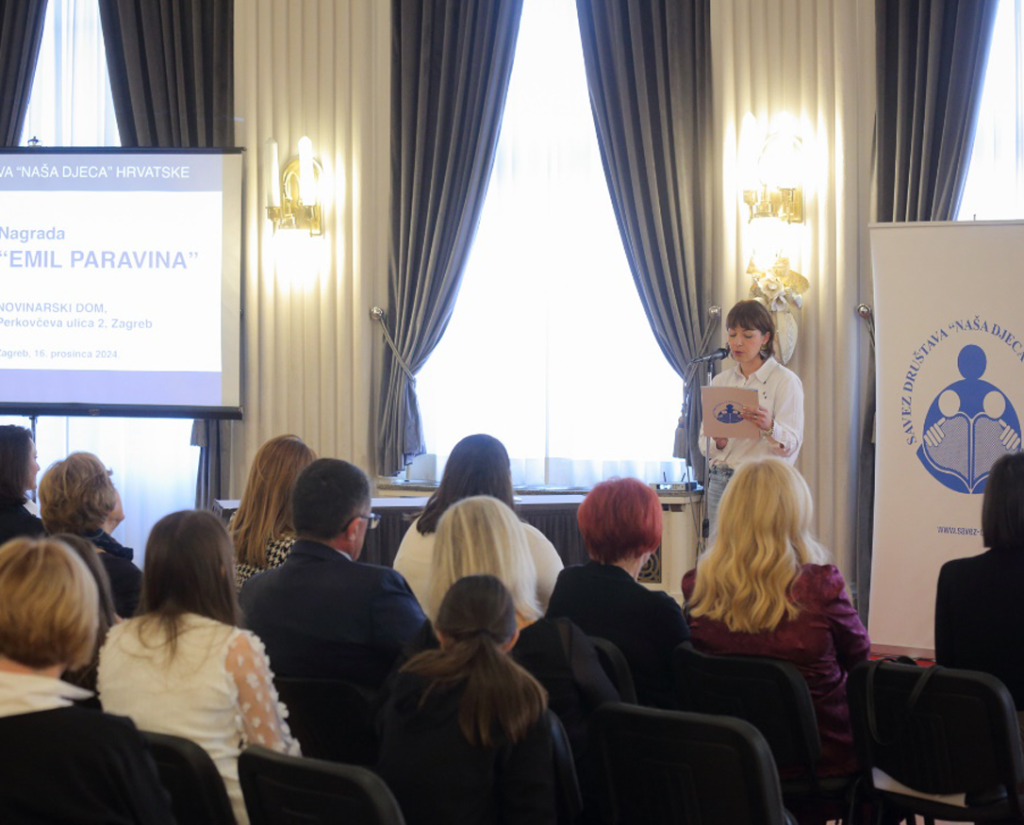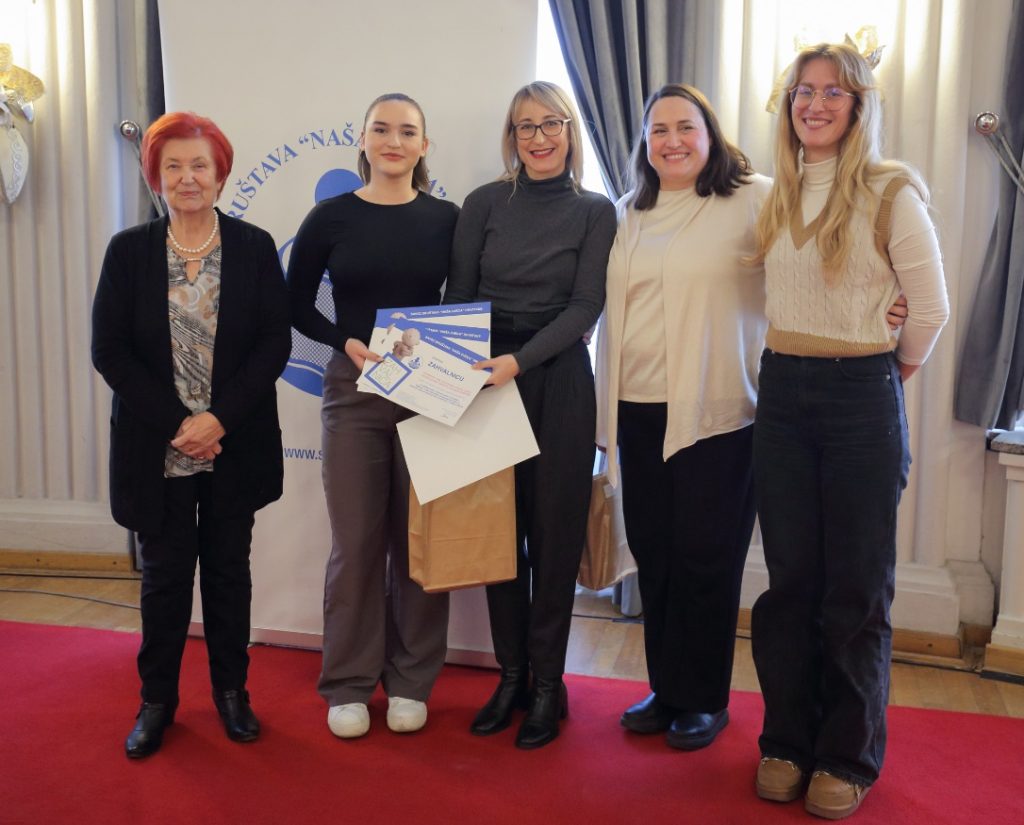The Advisory Board for the Care and Treatment of Children and Adolescents of the ISKORAK program has received a special award for the “Emil Paravina” Prize 2024
The Association of Societies “Our Children” of Croatia, the founder and organizer of the “Emil Paravina” award. For the fourth year in a row, it presents a unique award to children who stand out for their commitment to promoting children’s rights, child participation, cooperation and peer support. The prize is awarded in honor of Dr. sc. Emil Paravina, pedagogue, humanist, promoter of children’s rights and long-time secretary of the Association of Societies “Our Children”. Dr. sc. Emil Paravina was instrumental in drafting the UN Convention on the Rights of the Child, which celebrates its 35th anniversary this year.
Eight applications were received for the public call for entries for the prize. The jury consisted of five members, children members of the Children’s Councils from Bedekovčina and Ozalj, and adult members of the heads of the Children’s Council of the Municipality of Bedekovčina and the Children’s Council of the City of Ozalj.
The members of the Advisory Board for the Care and Treatment of Children and Adolescents of the ISKORAK program were honored with a special award, the “Emil Paravina” Award. The Commission recognized the work of the Advisory Board as a positive example of working with children from vulnerable groups and emphasized the importance of respecting their rights, voices and potential.
The partners of the ISKORAK program, the UNICEF Office for Croatia and the University of Zagreb Faculty of Education and Rehabilitation Sciences, received a special certificate of appreciation for their outstanding contribution to promoting children’s rights and supporting the participation of children from vulnerable groups.
On behalf of the members of the Advisory Board, long-standing member Gabrijela Plentaj accepted the award. The award ceremony was attended by Martina Tomić Latinac from the UNICEF Office for Croatia, Ivana Borić, head of the ISKORAK program, and Ivana Gazilj, educator at the Center for Community Services Banija-Karlovac and member of the Advisory Board for the Care and Treatment of Children and Adolescents.
Congratulations to the winners of the “Emil Paravina” Award – Aristea Tadić from the Children’s Council of the City of Sveti Ivan Zelina and the Children’s Forum and the Children’s City Councils of the City of Čakovec.
This award shows the importance of continuous work with children and young people to encourage them to actively participate in social processes and exercise their rights. Through the activities of the ISKORAK program, together we create a space in which children can freely express their views, make decisions and shape a better future for children and young people in out-of-home care.
For more information about the Award and the work of the DND, please visit the official website: https://savez-dnd.hr/


Photos: Mirko Cvjetko
SYSTEMS THAT
UNDERSTAND
AND CARE
International conference
„SKRB 2024 (CARE2024)
– Transforming Childcare Across Europe”
SEECEL building, University of Zagreb
18 – 20 September 2024
MORE ABOUT THE CONFERENCE
„SKRB2024 (CARE2024)– Transforming Childcare Across Europe”
More than 1400 experts and decision-makers from 20 countries and 58 young people with experience in childcare systems attended a three-day international conference “CARE 2024: Transforming Childcare in Europe”. The aim of the conference, organized by UNICEF, the Ministry of Labor, Pension System, Family and Social Policy, the Ministry of Justice, Public Administration and Digital Transformation and the University of Zagreb Faculty of Education and Rehabilitation Sciences with the support of the Center for Missing and Exploited Children, was to share the latest knowledge and practices to improve protection and support systems for children, youth and families in Croatia and Europe.
As part of the extensive program, participants had the opportunity to attend 27 plenary presentations, 9 panels, 1 round table and 2 workshops.
The SKRB2024 conference was an opportunity to exchange knowledge, experiences and best practices between experts from different countries and sectors and to make proposals for the future development of child and youth policy. Please read our call for action CALL TO ACTION
“The CARE 2024 conference is an important step in redefining the way we approach childcare in Croatia and Europe. We have come together to discuss solutions that will provide a better future for many children currently in care. Our message is clear: every child deserves the opportunity to grow up in a safe family environment and families should have access to the services and support they need to care for their child at home. Collaboration among all stakeholders, like at the CARE 2024 conference, is key to long-term change and child care transformation. Together we can and must develop systems that understand children’s needs and care for children’s well-being and provide them with the best possible conditions to reach their full potential,” said Luisa Brumana, Head of the UNICEF Office for Croatia, at the opening of the conference.
State Secretary at the Ministry of Labor, Pension System, Family and Social Policy, Margareta Mađerić, emphasized that the Government of the Republic of Croatia is investing great efforts in the system for protecting the well-being of children. “Services for vulnerable families have been improved, the strengthening of parental competences and the provision of quality and effective support services for families with children are supported, continuous work is being done to improve and expand the foster care system, and a campaign is underway to promote the foster care system in order to attract new foster parents,” said State Secretary Mađerić.
The State Secretary at the Ministry of Justice, Public Administration and Digital Transformation, Vedrana Šimundža-Nikolić, expressed her satisfaction with the cooperation with UNICEF so far in programs to support children in conflict with the law. She particularly emphasized the importance of lifelong training of professionals who run treatment programs with juvenile offenders who carry out the educational measure of referral to correctional facilities within the justice system, but also the importance of timely interventions implemented in the family and the community in which the young people live. Specialised support programmes for juvenile offenders are essential as they address the specific needs of young people who have grown up in difficult circumstances, offer them a new chance and reintegrate them into society rather than defining themselves by the crimes they have committed.
The CARE conference is being held for the second year in a row as part of the cooperation on the ISKORAK programme, which has been implemented since 2021 by UNICEF, the Ministry of Labor, Pension System, Family and Social Policy, the Ministry of Justice, Public Administration and Digital Transformation and the Faculty of Education and Rehabilitation Sciences at the University of Zagreb.
We would like to thank all speakers, panellists, partners and participants for their commitment and contribution. Special thanks go to the UNICEF Office in Croatia, the Ministry of Labour, Pension System, Family and Social Policy, the Ministry of Justice, Public Administration and Digital Transformation, UNICEF Regional Office for Europe and Central Asia, the University of Zagreb the Faculty of Education and Rehabilitation Sciences and the Centre for Missing and Exploited Children for making this conference a truly successful event.
We believe that all participants brought back valuable insights that will contribute to the future development and improvement of the care system for children, young people and their families in Croatia and Europe.
See you at the next conference SKRB2025!
Organising Committee
#SKRB2024 #SYSTEMS THAT UNDERSTAND AND CARE
CARE 2024
Up to 1400 professionals from 20 countries and 58 young people with experience of living in care systems participated in the conference. The conferencewas also streamed online to allow wide participation, learning, and knowledge sharing.
Participants:
- Children and youth with experience in alternative care
- Experts in the fields of childcare, juvenile justice, health, and education
- Members of academia and researchers
- Child protection staff from UNICEF country offices in Europe and EU accession countries
- Experts in the field of monitoring alternative care for children, including representatives of national bodies that monitor and evaluate the situation of children in alternative care, prepare national statistics and conduct relevant research
- Representatives of relevant national and subnational government (national and EU)
- Child Ombudsman Offices and ENOC
- Representatives from relevant organizations (national and EU) in the field of childcare
- Representatives of the European Commission and Council of Europe
KEY TOPICS OF THE CONFERENCE
Overview of the state of childcare in Europe and Croatia
Strengthening child protection systems and integrated approaches to child protection
Data collection and monitoring of key indicators and quality of alternative care
Prevention of institutionalization, early assessment, gatekeeping, and services for families at risk
Foster care
Specialized support interventions and therapeutic care
Social inclusion of children with developmental difficulties
Alternative care in emergencies
Child Participation in alternative care
Lessons learned in the utilization of EU funds for the enhancement of childcare and budgeting.
MEMBERS OF THE PROGRAM AND ORGANIZATION COMMITTEE
PROGRAM COMMITTEE
- Martina Tomić Latinac, UNICEF Office in Croatia
- Martina Štabi, UNICEF Office in Croatia
- Ivana Zadro, UNICEF Office in Croatia
- Ardita Dreshaj, UNICEF Office in Croatia
- Marijana Šalinović, UNICEF Office in Croatia
- Djurdjica Ivković, UNICEF Office in Croatia
- Stela Grigoras, UNICEF Regional Office for Europe and Central Asia
- Ina Verzivolli, UNICEF Regional Office for Europe and Central Asia
- Anja Teltschik, UNICEF Regional Office for Europe and Central Asia
- Nora Shabani, UNICEF Regional Office for Europe and Central Asia
- Tatjana Katkić Stanić, Ministry of Labour, Pension System, Family and Social Policy
- Josipa Maras Babić, Ministry of Justice, Administration and Digital Transformation
- Sanja Vladović, Ombudsman for Children’s Office
- Ivana Borić, University of Zagreb Faculty of Education and Rehabilitation Sciences
- Andrea Ćosić, University of Zagreb Faculty of Education and Rehabilitation Sciences
- Marijana Majdak, University of Zagreb Social Work Study Centre
- Anita Barišić, Josip Juraj Strossmayer University of Osijek Faculty of law
- Marija Igrec, Forum for Quality Foster Care
- Anica Katačić, Croatian Institute for Social Work
- Marija Lukec Presker, Academy of Social Welfare
- Tomislav Ramljak, Center for Missing and Exploited Children
ORGANIZING COMMITTEE
- Martina Tomić Latinac, UNICEF Office in Croatia
- Martina Štabi, UNICEF Office in Croatia
- Ivana Zadro, UNICEF Office in Croatia
- Ardita Dreshaj, UNICEF Office in Croatia
- Vanja Šarac, UNICEF Office in Croatia
- Marin Ilej, UNICEF Office in Croatia
- Morana Tuškan, UNICEF Office in Croatia
- Tatjana Katkić Stanić, Ministry of Labour, Pension System, Family and Social Policy
- Martina Cvitanović, Ministry of Labour, Pension System, Family and Social Policy
- Katarina Špehar Fiškuš, Ministry of Labour, Pension System, Family and Social Policy
- Anela Olujić, Ministry of Labour, Pension System, Family and Social Policy
- Monika Pozderac, Ministry of Labour, Pension System, Family and Social Policy
- Josipa Maras Babić, Ministry of Justice, Administration and Digital Transformation
- Ivana Borić, University of Zagreb Faculty of Education and Rehabilitation Sciences
- Andrea Ćosić, University of Zagreb Faculty of Education and Rehabilitation Sciences
- Andreja Šprem, University of Zagreb Faculty of Education and Rehabilitation Sciences
- Tomislav Ramljak, Center for Missing and Exploited Children
- Sara Smojver, Center for Missing and Exploited Children
